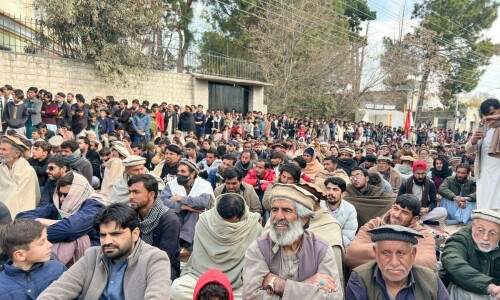ISLAMABAD, Aug 12: Pakistan needs to move cautiously with the process of trade liberalization, especially with regard to lowering of bound tariffs — a limit beyond which customs duty on products could not be increased — and withdrawal of subsidies in the agriculture sector.
This was one of the recommendations of a research report on “impact of trade liberalization on agriculture” prepared by Dr Wajid Pirzada and commissioned by Actionaid Pakistan.
The report, a copy of which was available with Dawn, suggests to the government that for informed policy-making, a broad based consultation on participatory basis needs to be institutionalized involving major stakeholders, especially small farmers, civil society, progressive farmers, breeders, academia, researchers, policy-makers and planners.
The 148-member WTO countries are expected to finalize modalities for the elimination of subsidies, support and downward revision of tariff on agriculture produce in the upcoming ministerial conference to be held in Hong Kong in December.
The report says that at the WTO, Pakistan should seek coalition with those countries that share common interest, and asked for removal of inequities and imbalance in the WTO agreement on agriculture (AoA).
Similarly, the IMF and the World Bank need to revisit their policies and programmes, such as structure adjustment programmes (SAPs), to remove inequalities, if they wanted to combat the real threat, which these policies imposed, in the form of political and social instabilities.
According to the report, food and social security issues needed to be focussed sharply in national agriculture policies and national development plans, seeking enhance investment in farm and farming and the very poor. Food security is achieved when all people, at all times, have access to sufficient food for healthy and productive life. It has thus three main components — food availability, food access and food utilization.
The food availability refers to the need to produce sufficient food in a way that generates income for small-scale producers, while not de-planting the natural resource base and to the need to get this food into markets for sale at price that consumer could afford.
The report apprehends that if present trend in agriculture growth, food production, income of small producers, employment opportunity and thus poverty continue, the gap between food production and requirement would grow rapidly, making Pakistan a food insecure country.
In poverty alleviation initiatives like under poverty alleviation fund, appropriate measures aiming at welfare of communities, such as small farmers and consumers, public work schedules and strengthening of social safety net, especially for women and children, needed to be taken.
The report recommends to government to revisit policy of withdrawal of support to farmers, including subsidies for agriculture inputs, and must avail of 10 per cent de minimis provision under the AoA.
Pakistan needs to strive for securing financial support, to enhance agricultural productivity, from developed countries provided in AoA, and technical and financial support for establishment of effective research and regulatory bodies.














































Dear visitor, the comments section is undergoing an overhaul and will return soon.